
China's plan to board and search ships that illegally enter what Beijing considers its territory in the disputed South China Sea is a very serious turn of events, the head of the Association of Southeast Asian Nations said on Friday.
"My reaction is (this is) certainly an escalation of the tension that has already been building. And it is a very serious turn of events," ASEAN Secretary-General Surin Pitsuwan told Reuters in a telephone interview.
"It is extremely important to exercise restraint and to try to approach this development with a level head and be open to listen to concerns of all parties, all sides," he said.
The South China Sea is Asia's biggest potential military trouble spot with several Asian countries claiming sovereignty over waters believed to be rich in oil and gas.
China claims virtually the entire sea. The Philippines, Taiwan, Vietnam, Brunei and Malaysia claim various parts.
The shortest route between the Pacific and Indian Oceans, the South China Sea has some of the world's busiest shipping lanes. More than half the globe's oil tanker traffic passes through it.
New rules, which come into effect on Jan. 1, will allow police in the southern Chinese province of Hainan to board and seize control of foreign ships which "illegally enter" Chinese waters and order them to change course or stop sailing, the official China Daily reported.
"It certainly has increased a level of concern and a level of great anxiety among all parties, particularly parties that would need the access, the passage and the freedom to go through," said Surin, speaking from Thailand.
"The problem is that you can stake the claim, you can initiate measures and policies but there is that potential of misunderstanding, miscalculation that could lead to major tension and major incidents," he said.
The move, if mishandled, could undermine confidence in East Asia as a locomotive of global economic growth, he said, adding that whether or not it was legal depended on the positions of the parties involved.-Interaksyon (November 30, 2012 3:05PM)

No comments:
Post a Comment